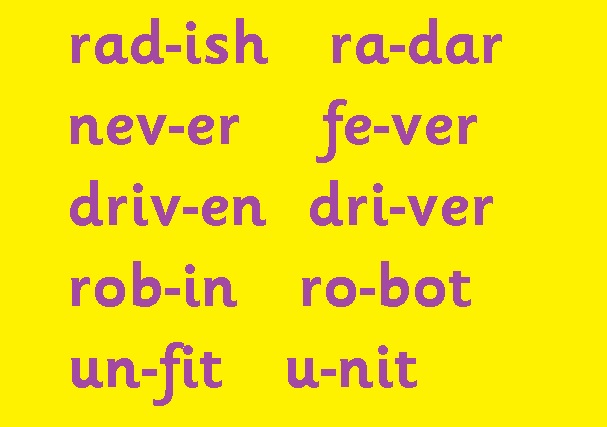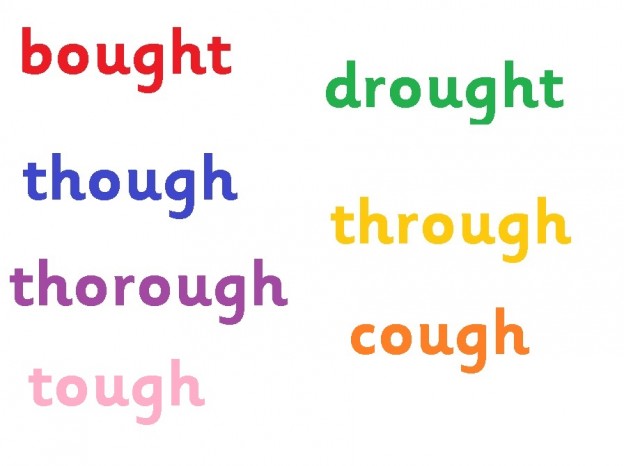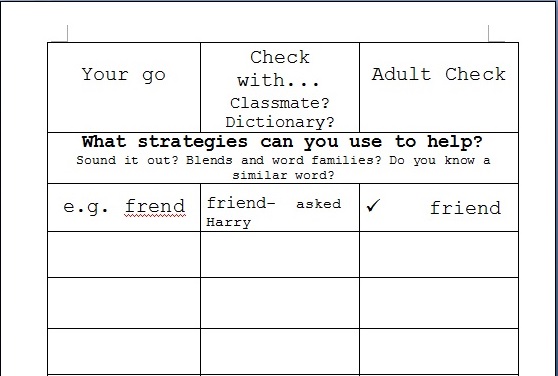Open and closed syllables
88 Replies
The first syllables in words like “atom”, “centre”, “filter”, “shopping”, “rubbish” and “pullet” contain a “short” vowel, which must be followed by a consonant in English. These are sometimes called “closed” syllables.
The first syllables in words like “paper”, “being” “final”, “hoping”, “brutal” and “future” end with a “long” vowel, and are sometimes called “open” syllables.
Tackling one syllable at a time
When learners start reading and spelling multi-syllable words, it’s useful to get them to practice reading and writing words which contrast “closed” and “open” syllables.
The spelling ough
14 Replies
The spelling "ough" can be pronounced eight different ways in English.
Don't panic, there aren't many words, and some of them are so arcane I usually don't bother teaching them. But let's be fairly comprehensive here.
There are five different single sounds, and three sound combinations.
- "aw" as in bought, brought, fought, nought, ought, sought, thought and wrought iron.
- "ou" as in when the bough or the drought breaks, and the UK spelling of plough (in the US regularised to plow), as well as doughty old characters, the soughing wind and a deep slough of depression.
- "oh" as in dough, furlough and though, as well as doughnut and although, if you want to count them separately.
- "ooh" as in through.
- "uh" as in thorough and borough, and names like Gainsborough, Marlborough, Peterborough and Scarborough.
- "u" plus "f" as in rough, tough and enough, plus a snake sloughing off its skin.
- "o" plus "f"* as in cough, former Australian Prime Minister Gough Whitlam and a cattle trough.
- "u" plus "p" in hiccough, though nowadays many people seem to spell this hiccup.
That's it, as far as I know. Not so terrible after all.
* The "gh" spelling of the sound "f" is also used in the word "laugh", and goes after a vowel. Before a vowel, "gh" usually represents the sound "g" as in "Afghan", "ghost", "spaghetti" and "yoghurt".
Have a go spelling
13 Replies
In class, many of the students I work with are encouraged to "have a go" at spelling words that they aren't sure how to spell.
Often this happens when they have spelt a word incorrectly in their first draft of a piece of written work.
The teacher then points out the error, but doesn't correct it.
Instead, the student is encouraged to problem-solve the spelling, by asking classmates, trying to sound it out, thinking about word families or similar words, or looking it up in a dictionary.
If you google "have a go spelling", you can even find a free workbook for this purpose. The front of it looks like this (the fonts are a bit out of whack because I don't have the SA school font, but it is an MS Word document so this could be easily fixed):
The remaining pages have three columns: one for the word as misspelt, one for the student's "go" and one for the correct spelling as checked by an adult.



